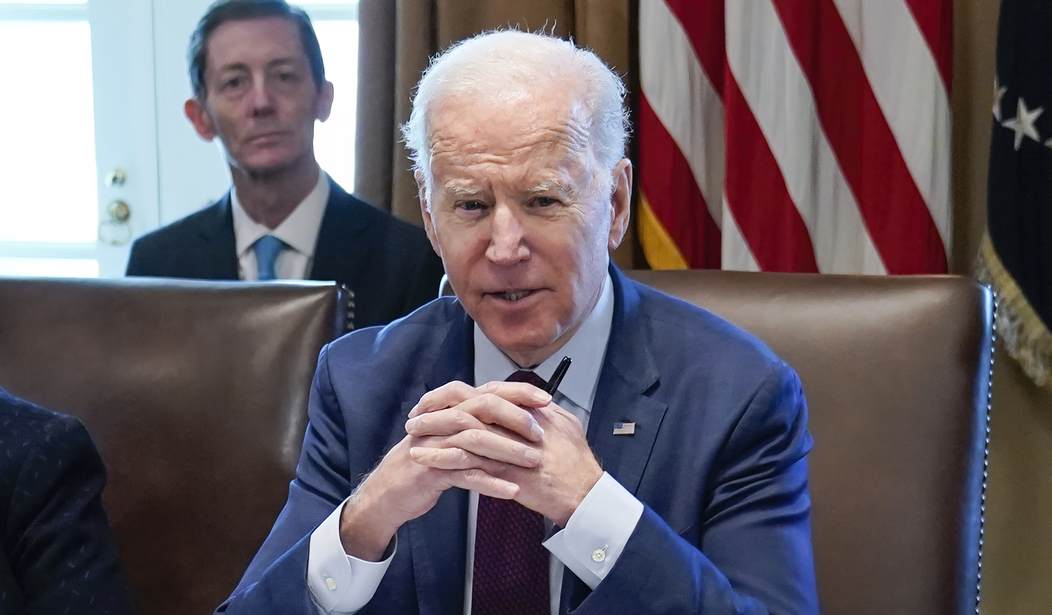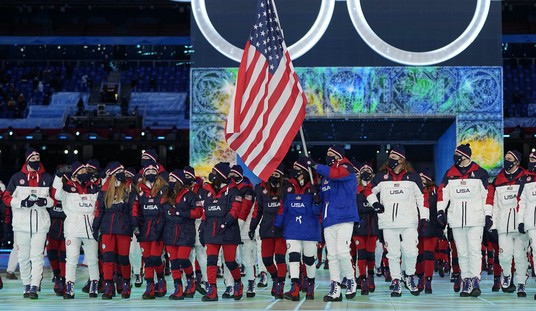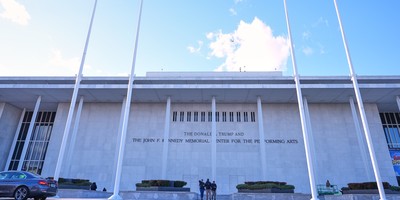There was a striking moment on NBC's "Meet the Press" Sunday. Moderator Chuck Todd brought up a poll recently released by National Public Radio and Marist that showed President Joe Biden's job approval rating at 47%, with a disapproval rating of 50%. The screen showed that poll in contrast to another NPR/Marist survey from two weeks earlier that showed Biden's approval rating at 39%, with a 55% disapproval rating. One poll was done before Biden's State of the Union address and the Russian invasion of Ukraine; the other was done after.
The more recent poll was "the first one fully after invasion," Todd noted. What accounted for the improvement in Biden's standing? "I don't think this is a State of the Union bounce," Todd said. "This appears to be the first of what could be called 'rally around the flag.' Post-Ukraine, job approval rating almost above water. His approval on the handling of Ukraine now above water." Todd warned that the poll "could be an outlier." Still, he said, "we may be in the middle of a shift in politics, with it being driven by Ukraine."
There was a hopeful feel to the conversation -- maybe Biden is coming back! -- with cautions, by both Todd and NBC's Hallie Jackson, that the poll might not accurately reflect what is actually happening. And sure enough, after the NPR/Marist poll was released, three other polls came out in quick succession -- all done after the Ukraine invasion -- that showed Biden's approval rating at 44%, 39% and 40%, respectively -- in line with the low 40s in which Biden has been mired for months.
The hope among Democrats, of course, is that Biden's job approval rating might improve enough to be an asset, instead of a liability, for the party in the upcoming midterm elections. But that will most likely not happen. Elections analyst Nathan Gonzales looked into the interplay between presidential job approval and midterm results for the last seven decades, and his findings do not give Democrats much hope.
Recommended
"Looking back more than 70 years, there hasn't been a single president who substantially improved his job approval rating from late January/early February of a midterm election year to late October/early November," Gonzales wrote. "In the last 18 midterm elections going back to Harry Truman in 1950, the average president's job approval rating dropped 8 points between this time of year and Election Day."
Democrats hope that war in Ukraine will change that long-term trend and actually help Biden's rating -- the "rally around the flag" effect. But of course, no one knows the direction the Russian invasion of Ukraine will take. And the "rally around the flag" effect would normally apply more to a conflict in which Americans are actual combatants, and not one the U.S. is trying very hard to stay out of. But Democrats still hope.
What should be of greater concern to Democrats is the likelihood that the news of the moment from Ukraine will not change long-term underlying trends in party loyalty. The most important of those trends is the Democrats' loss of support among nonwhite voters. The party, which regularly loses white voters in national elections, has based its electoral hopes on strong support among nonwhite voters. "Since Democrats tend to lose the overall white vote by solid margins," writes Democratic strategist Ruy Teixeira, "the Democratic electoral theory of the case is based around carrying the much smaller, 27-28% of voters who are nonwhite by far larger margins."
It all depends on winning big -- very big -- among nonwhite voters. But now, those nonwhite voters are moving away from Democrats. The party still wins among them, but by smaller margins than just a few years ago. The question for Democrats, if they are not going to appreciably improve their performance among white voters, is how to stop the loss of nonwhite voters.
Teixeira believes Democrats have become too ideological in recent years -- he summarizes the party's current platform as "the 'racial reckoning' + Build Back Better." Teixeira continues: "The assumption seemed to be that all nonwhites as 'people of color' share a perception of America as a fundamentally racist society and are committed enough to transformative progressive programs to overlook their everyday difficulties."
But nonwhite voters, Teixeira writes, "are far less ideological" than that. "What nonwhite voters want is effective governance, safe communities, improved living standards and a normally functioning society," Teixeira writes. "Those take precedence over ideological commitments." Jobs, the economy, health care -- those are issues that appeal to the broad middle of nonwhite voters. And this year, of course, there are the specific issues of inflation and crime that could be particularly difficult for Democrats.
So given all that, is there, in fact, a "shift in politics ... driven by Ukraine" that will help Democrats win in November? It is possible in the sense that anything is possible. But barring Ukraine turning into a far bigger war -- and let us pray that it does not -- the fundamental factors defining the domestic political moment in the United States are unlikely to change. And that remains worrisome for Democrats.
This content originally appeared on the Washington Examiner at washingtonexaminer.com/opinion/hopefully-hoping-for-biden.
Byron York is chief political correspondent for The Washington Examiner.
























Join the conversation as a VIP Member